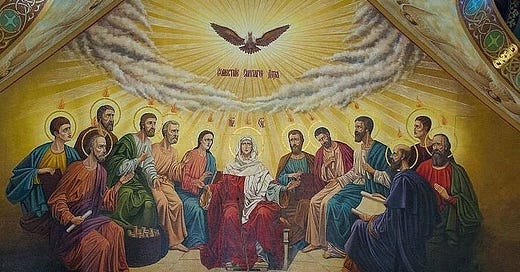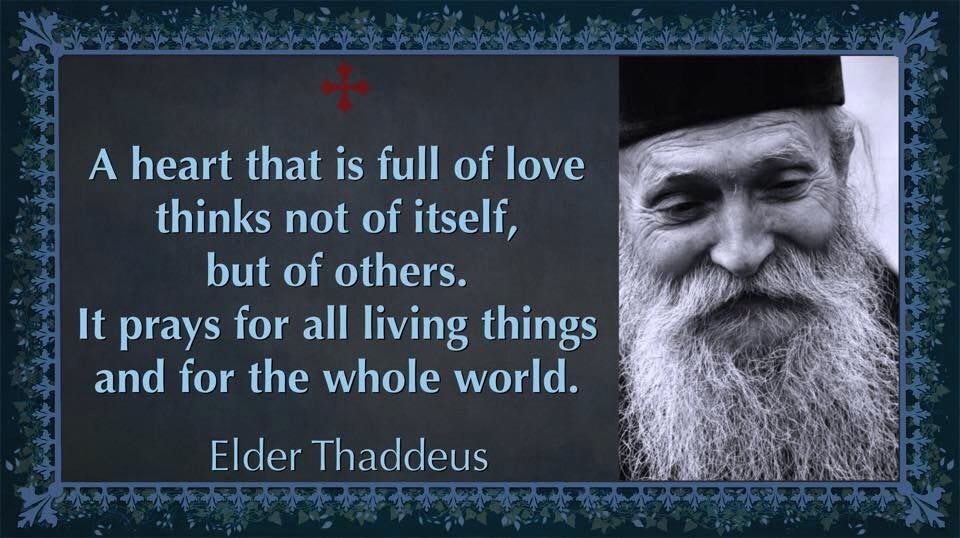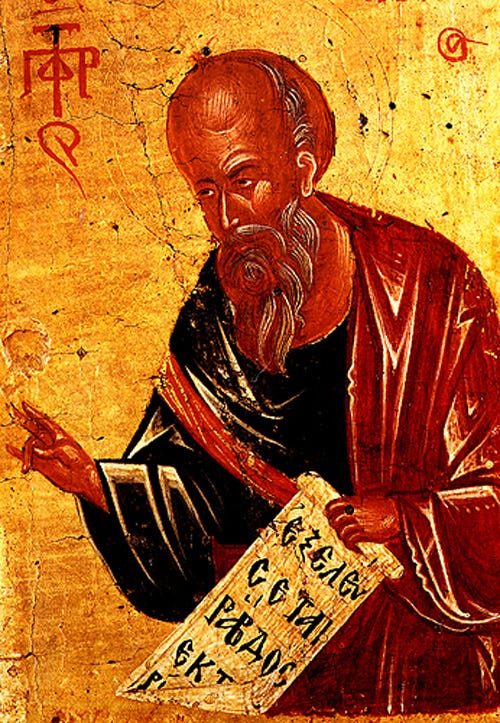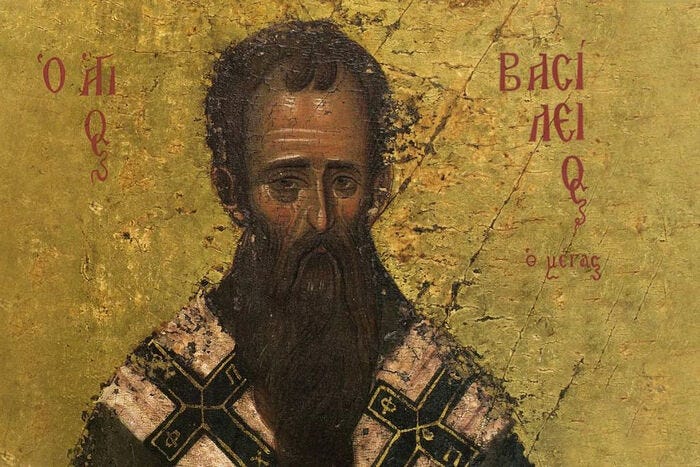Romans 1:7-12 (Epistle)
7 To all who are in Rome, beloved of God, called to be saints: Grace to you and peace from God our Father and the Lord Jesus Christ.
8 First, I thank my God through Jesus Christ for you all, that your faith is spoken of throughout the whole world.
9 For God is my witness, whom I serve with my spirit in the gospel of His Son, that without ceasing I make mention of you always in my prayers,
10 making request if, by some means, now at last I may find a way in the will of God to come to you.
11 For I long to see you, that I may impart to you some spiritual gift, so that you may be established –
12 that is, that I may be encouraged together with you by the mutual faith both of you and me.
Matthew 5:42-48 (Gospel)
42 Give to him who asks you, and from him who wants to borrow from you do not turn away.
43 You have heard that it was said, ‘You shall love your neighbor and hate your enemy.’
44 But I say to you, love your enemies, bless those who curse you, do good to those who hate you, and pray for those who spitefully use you and persecute you,
45 that you may be sons of your Father in heaven; for He makes His sun rise on the evil and on the good, and sends rain on the just and on the unjust.
46 For if you love those who love you, what reward have you? Do not even the tax collectors do the same?
47 And if you greet your brethren only, what do you do more than others? Do not even the tax collectors do so?
48 Therefore you shall be perfect, just as your Father in heaven is perfect.
Prophet Elisha (9th c. B.C.)
The Holy Prophet Elisha lived in the ninth century before the Birth of Christ, and was a native of the village of Abelmaum, near Jordan. By the command of the Lord he was called to prophetic service by the holy Prophet Elias (July 20).
When it became time for the Prophet Elias to be taken up to Heaven, he said to Elisha, “Ask what shall I do for you, before I am taken from you.” Elisha boldly asked for a double portion of the grace of God: “Let there be a double portion of your spirit upon me.” The Prophet Elias said, “You have asked a hard thing; if you see me when I am taken from you, then so shall it be for you; but if you do not see me, it will not be so” (4 [2] Kings 2: 10). As they went along the way talking, there appeared a fiery chariot and horses and separated them both. Elisha cried out, “My father, my father, the chariot of Israel and its horsemen!” (4 Kings 2: 12). Picking up the mantle of his teacher which fell from the sky, Elisha received the power and prophetic gift of Elias. He spent more than 65 years in prophetic service, under six Israelite kings (from Ahab to Joash). While Elisha lived, he did not tremble before any prince, and no word could overcome him (Sirach 48: 13 [“Sirach” is called “Ecclesiasticus” in Catholic Bibles ]).
The holy prophet worked numerous miracles. He divided the waters of the Jordan, having struck it with the mantle of the Prophet Elias; he made the waters of a Jericho spring fit for drinking; he saved the armies of the kings of Israel and Judah that stood in an arid wilderness by bringing forth abundant water by his prayer; he delivered a poor widow from death by starvation through a miraculous increase of oil in a vessel. This Shunamite woman showing hospitality to the prophet was gladdened by the birth of a son through his prayer, and when the child died, he was raised back to life by the prophet. The Syrian military-commander Namaan was healed from leprosy but the prophet’s servant Gehazi was afflicted since he disobeyed the prophet and took money from Namaan.
Elisha predicted to the Israelite king Joash the victory over his enemies, and by the power of his prayer he worked many other miracles (4 Kings 3-13). The holy Prophet Elisha died in old age at Samaria. “In his life he worked miracles, and at death his works were marvellous” (Sir. 48: 15). A year after his death, a corpse was thrown into the prophet’s grave. As soon as the dead man touched Elisha’s bones, he came to life and stood up (4 Kings 13: 20-21). The Prophet Elisha and his teacher, the Prophet Elias, left no books behind them, since their prophetic preaching was oral. Jesus, son of Sirach, praised both great prophets (Sir. 48:1-15).
John of Damascus composed a canon in honor of the Prophet Elisha, and at Constantinople a church was built in his honor.
Julian the Apostate (361-363) gave orders to burn the relics of the Prophet Elisha, Abdia (Obadiah) and John the Forerunner, but the holy relics were preserved by believers, and part of them were transferred to Alexandria.
In the twentieth century, the humble priest Nicholas Planas had a great veneration for the Prophet Elisha, and was accounted worthy to see him in visions.
The Holy Spirit in the Orthodox Tradition
by Metropolitan Serafim (Joanta) of Germany and Central Europe
If we try to describe our perception and experience of the Holy Spirit, we will quickly realize that human words are not enough for this. All attempts at verbal systematization run the risk of locking us in an abstract and conceptual world that has little to do with living spiritual life. This is the disadvantage of academic theology, which does not allow us to be inspired by the spirit of asceticism and prayer. That is why the Russian theologian Vladimir Lossky said that theological concepts about God are certainly important, but after familiarizing ourselves with them we should put them aside so as not to lock God into mental constructs: For the letter killeth, but the spirit giveth life (2 Cor. 3:6). We also know that The wind bloweth where it listeth (Jn. 3:8), and no one can set boundaries for the Spirit.
I would like to say a few words about the work of the Holy Spirit in the Orthodox Church and in the lives of the faithful. It is so important that one of the greatest Russian saints, St. Seraphim of Sarov, taught: “The true purpose of Christian life is acquiring the Holy Spirit.” Nicholas Afanasiev, one of the greatest theologians of the Russian diaspora, Professor of Theology at St. Sergius Institute in Paris († 1966), summarized the results of his research in ecclesiology in a book entitled, Église du Saint Esprit (from French: “The Church of the Holy Spirit”). I think it would have been impossible to find a better title to express this fundamental truth of Orthodoxy in one word: our Church is that of the Holy Spirit.
The author came to this title because the early Church saw itself as a Eucharistic community headed by a bishop, through which the Universal Church was constantly being renewed. The Church celebrates the Eucharist as a gathering of the faithful, and Communion of the Body and Blood of Christ transforms believers into the Church, which is the Body of Christ. This mystical transformation is accomplished by the Holy Spirit. The whole Eucharist is full of fire and Spirit, as St. Ephraim the Syrian (fourth century) wrote. Eastern Christians attach great importance to the Epiclesis—that is, the invocation of the Holy Spirit over the faithful and the Eucharistic Gifts in the form of bread and wine so that they can become the Body and Blood of Christ.
In the Liturgy of St. John Chrysostom, the Epiclesis reads as follows: “Again we offer unto Thee this reasonable and bloodless worship, and we ask Thee, and pray Thee, and supplicate Thee: Send down Thy Holy Spirit upon us and upon these gifts here offered. And make this bread the precious Body of Thy Christ. And that which is in this cup, the precious Blood of Thy Christ. Making the change by the Holy Spirit.” In fact, the entire Eucharist is a continuous Epiclesis, which ends with the consecration of the Gifts and adding of warm water into the Holy Chalice before Communion. In this case water symbolizes grace-filled faith.
St. Ephraim the Syrian says, “Henceforth you will eat a pure and immaculate Pascha—perfect bread, kneaded and baked by the Holy Spirit, and wine mixed with fire and the Spirit.” The Orthodox Church is filled with the Holy Spirit, Who fills everything in it with His presence. The Church sacraments, services, daily prayers, and Church activities are inspired by the Holy Spirit. He works in everything in the Church. Thus, in the Orthodox tradition, both church and private prayer of the faithful always begins with the invocation of the Holy Spirit, and then the Spirit itself maketh intercession for us with groanings which cannot be uttered (Rom. 8:26). The tradition of the Eastern Church has never exaggerated the role of the Son of God to the detriment of the Holy Spirit, but has always considered the joint work of the Three Persons of the Holy Trinity. Almost all church prayers, whether they are addressed to the Father, to the Son, to the Holy Spirit, to the Mother of God or the saints, end with a Trinitarian Doxology: “For Thine is the Kingdom, and the power, and the glory, of the Father, and of the Son, and of the Holy Spirit. Forever. Amen.” The Liturgy also begins with the following words: “Blessed is the Kingdom of the Father, and of the Son, and of the Holy Spirit, now and ever, and unto the ages of ages.”
St. Basil the Great said: “The path to the knowledge of God leads from the knowledge of the Holy Spirit, through the Son of God to God the Father. Goodness, holiness, and royal dignity come from the Father through the Son and reach the Spirit.” And the Spirit communicates all this to the faithful. The Holy Spirit is the Bearer of the Threefold grace that sanctifies all Creation. The Orthodox tradition calls the Father the Creator, the Son the Redeemer, and the Holy Spirit the Comforter. The Holy Spirit is the most mysterious Person of the Holy Trinity. If the Father revealed Himself through the Son Who became a man visible to people: He that hath seen Me hath seen the Father (Jn. 14:9), then the Holy Spirit did not reveal His Face.
As we know, in the New Testament the Holy Spirit appeared at the Baptism of the Lord in the form of a dove, and at Pentecost—in the form of tongues of fire. The theologian Vladimir Lossky stated that the Face of the Spirit is reflected on the faces of believers striving for holiness. The face of a holy man is that of the Spirit, because it is the Holy Spirit Who sanctifies the believer and imprints His Face on him. But even if someone’s sanctification is solely a gift from the Holy Spirit, He expects our cooperation through our faith, striving for virtue, and fighting sin and passions. It is about the mysterious synergy between the Spirit and the believer’s will throughout his life: For we are labourers together with God: ye are God’s husbandry, ye are God’s building (1 Cor. 3:9).
Here we should recall the maxim of the ascetic tradition: “Give blood and receive the Spirit.” These words can only be grasped through faith, since here we are speaking about death and resurrection in the case of each one of us, about a change of mind. The Apostle Paul says: For by grace are ye saved through faith; and that not of yourselves: it is the gift of God (Eph. 2:8); For it is God Which worketh in you both to will and to do of His good pleasure (Phil. 2:13). In the prayer, “O Heavenly King,” the Holy Spirit is referred to as “the Giver of life” because life comes from Him, and it is He Who guides us on an unfathomable path to perfection. The believer gradually begins to realize the effect of grace in all events of his life, both major and minor, positive and negative. He can also grasp the work of the Holy Spirit in retrospect, looking back at his life events whose significance he had not previously realized.
This week’s calendar reminders:
Monday 6/9: Matins 8:30 a.m.
Tuesday 6/10: no services or events
Wednesday 6/11: no services or events
Thursday 6/12: Matins 8:30 a.m.
Friday 6/13: Matins 8:30 a.m.
Saturday 6/14: Women’s Group 9 a.m.; Catechumen Class 4:30 p.m.; Great Vespers 6 p.m.
Sunday 6/15: Hours & Divine Liturgy, Bryce Chrismation 9 a.m.
CLICK BELOW to donate online:
Christ the Savior Orthodox Church is located in Southbury, Connecticut, and is part of the New England Diocese of the Orthodox Church of America.
Mailing address: Christ the Savior Church, 1070 Roxbury Road, Southbury, CT 06488
PLEASE DONATE to help our parish do the work of the Lord, thrive and grow, and extend the Kingdom of God. May the Lord bless your generosity!
Fr. Moses Locke can be reached at frmoseslocke@gmail.com












